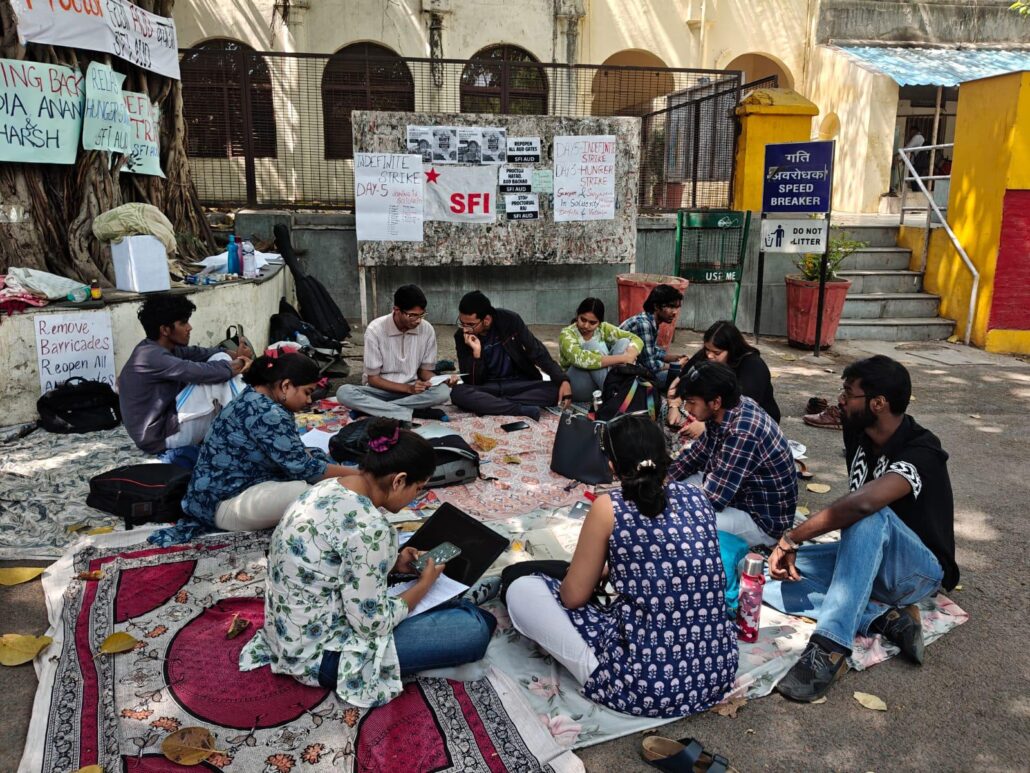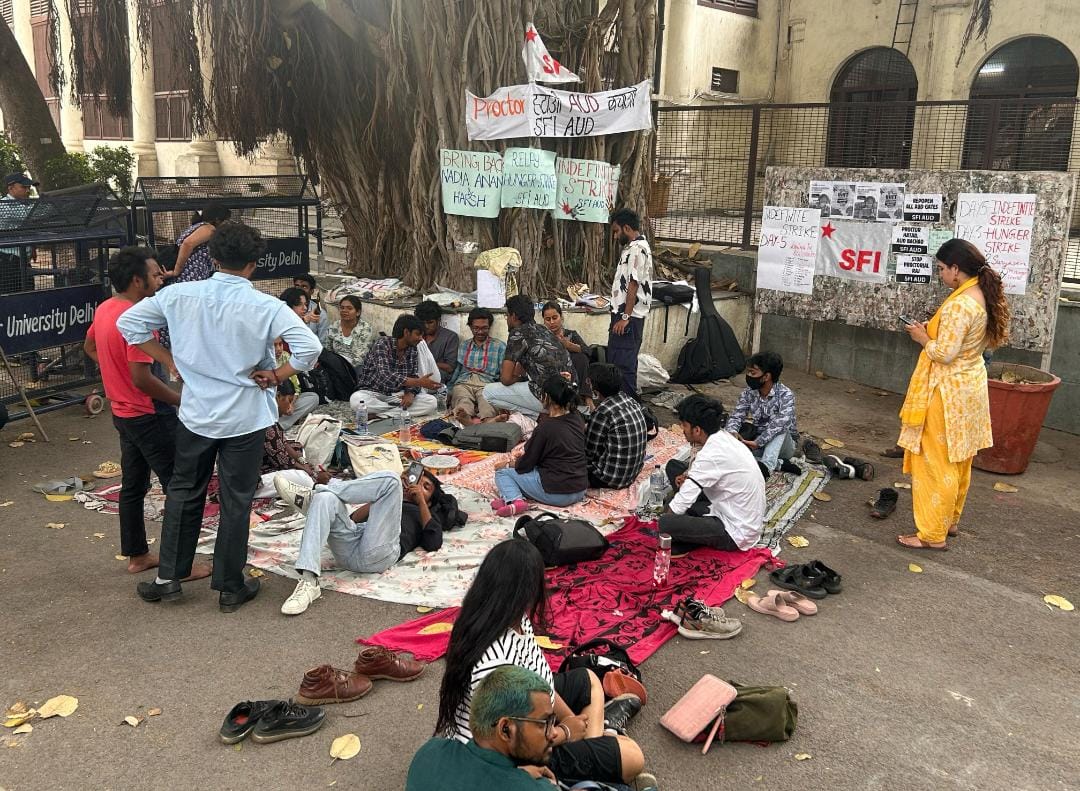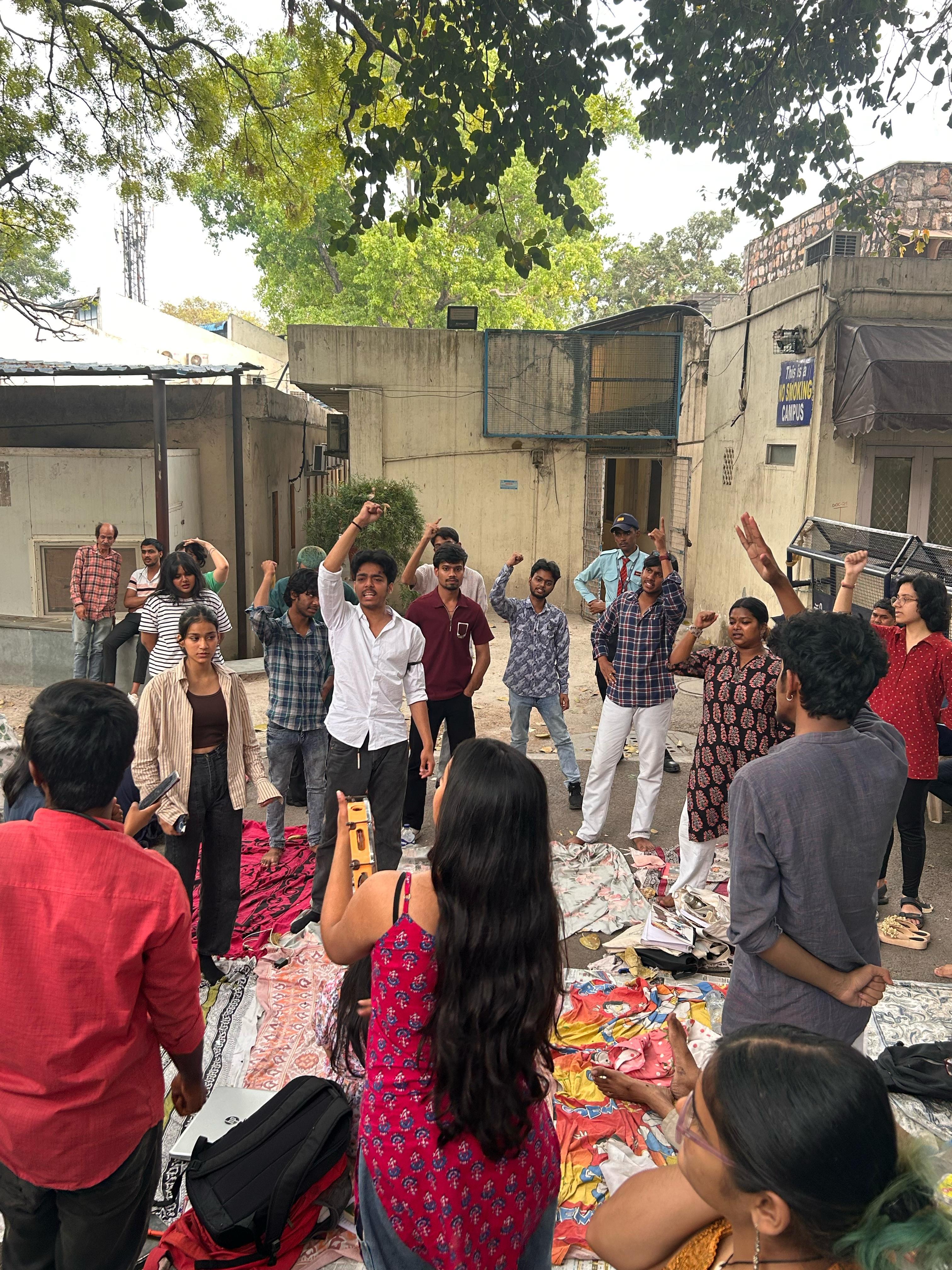
Anusha Imtiyaz
Dr. B R Ambedkar University, Delhi, built on Bhim Rao Ambedkar’s vision and ideals of equality, inclusion, and justice, ironically, stands barricaded amidst security deployment on his Jayanti— barring the entry of students and protesters.
This comes in the wake of a series of protests and demonstrations by students who, on Friday, April 11, were allegedly met with assault by security personnel. Videos online were circulated where several student protestors are seen outside the university gate, being handled and removed from the site. Activists claim they were “beaten, manhandled, and groped by the personnel deployed.”
Students of Ambedkar University, Delhi (AUD), who now have been protesting for weeks. Several students on a hunger strike and sit-in demonstrations have demanded a reclamation of campus by iterating that the barricades be lifted, suspensions revoked, and protests be acknowledged as a part of the university’s democracy— allowing free speech and expression in the campus.

Here is the detailed timeline to understand what has been happening at AUD.
Vice-chancellor’s speech on Ram Janambhoomi sparks controversy
After the speech on Republic Day by the Vice Chancellor (VC) of AUD, who, according to activists, “justified” Babri Masjid’s demolition while also claiming that Ambedkar’s “miniaturisation” is a fault of the Dalit community, it was met with sharp criticism from student activists. Mantasha Irfan, a student of the university and affiliated with All India Students Association (AISA), who publicly critiqued this speech, received a show-cause notice on February 17 for “using derogatory language against the VC.”
What followed were days of communication with the disciplinary committee over email, where Mantasha, including her parents, were served a “show cause notice” asking them to be present in front of the committee. According to activists, Mantasha was verbally harassed during this meeting. Students claimed that Mantasha also faced discrimination because of her religious views before this incident.
March 5: Students protest against “bullying” on campus
According to some students, what was first seen as a case of bullying turned out to be far complex in retrospect, involving the disciplinary committee. The Student Federation of India (SFI) said that a student from B. A Global Studies student was “bullied” to the point of contemplating self-harm. The administration, however, stated that this case was “politicized” unnecessarily, misleading, and “was a personal issue of the students involved.”
A disciplinary committee decided that this case be resolved without imposing suspensions on the eleven students involved, comprising of accused bullies and some activists, however, the proctor, who was notably absent during this meeting, acted independently, overriding this decision. As a result, the eleven students—eight undergraduate students from Global Studies and three SFI activists— were suspended.
Later, out of the eight suspensions, seven were revoked, while three SFI suspensions are still ongoing.
Campus barricaded
On March 21, Mantasha was suspended and barred from access to university facilities. As a result, on March 24, student activists from AISA organised a public meeting and protest with Dr. Kaustav Banerjee and Dr. Gopalji Pradhan in solidarity against the suppression of students at AUD. The next day, on March 25, the Kashmere Gate campus was barricaded at the main gate that leads to the administrative block, hindering mobility.
On March 26, a solidarity gathering was held by students while Mantasha was in the meeting with the Disciplinary Committee on an appeal to revoke her suspension order. During this, a notice was released by the Estate Division on Proctor’s directions, banning protests in the area stretching from the main gate to Dara Shukoh museum.

The proctorial notice was burned by SFI protestors, which was joined by dozens of students, according to SFI. Since then, an indefinite sit-in has been called due to a lack of response from the administration.
April 01marked the first day of the indefinite sit-in. ‘Ek minute ka maun’ was screened at the protest site in commemoration of Com. Chandu’s death anniversary. “Food, water, and medicines were not allowed to pass through the gates on the order of the administration,” students present at the protest site claimed.
On the second day of the indefinite sit-in, the administration approached the protesters, affirming that Mantasha’s suspension would be reconsidered if the students left the protest site. However, the students stayed on campus due to a lack of a written confirmation.
On April 2, Dr. Banerjee received a show-cause notice for his involvement in the protest. On the fourth day of the sit-in, Mantasha’s suspension was revoked at 2 P.M. On 5th April, a press conference was held by SFI activists at the Press Club of India, demanding a revocation of the suspensions of the three SFI activists and addressing the “rampant attack upon the campus democracy.”
The students demanded the revocation of all three suspensions, the removal of barricades, the taking back of the proctorial notice released on 25th March, and the reopening of the main gate. However, due to no response from the administration, SFI called for an indefinite strike.
On April 7 and 8, a solidarity gathering for Professor Banerjee was held at the Karampura and the Kashmere Gate campus.
Recent developments:
To contest the suspension of three SFI members, SFI reached out to the Delhi High Court to contest the administrative decisions. On 8th April, during the second hearing, the university counsel sought additional time to follow “due process” by holding a review meeting. The next hearing is scheduled for 15th April.
Unconvinced by the lack of response from the administration, students on 9th April began an “Indefinite relay hunger strike.” On the fifth day of the strike, which marked the third day of the hunger strike, a protesting student fainted after long hours of hunger strike.
SFI activists then sought an appointment to meet with VC, to which they claim getting no response. “SFI then proceeded to assemble at the front gate of the university. This is where the situation got violent,” an activist of SFI said.
According to activists, the VC, Proctor, and Registrar attacked the protesting students. “Their clothes were torn, and female students were manhandled by the guards. The registrar and proctor verbally passed insensitive slurs on the protesting students,” claims a student activist. They further alleged that the Registrar attempted to run over a student by car.
The registrar, denying the SFI version of the incident, said that the protesters had “obstructed the passage of vehicles.”

“We have filed a police complaint, and the FIR is yet to be registered. They want to meet the V-C, but the V-C is not ready as their approach is aggressive. We are ready to address the issues of students, but there needs to be a proper way to have a conversation,” registrar Navlendra Kumar Singh said.
It was at this moment that things took a violent turn, where guards and police personnel then resorted to physically removing the activists from the site. The violence led to five students being suspended and their email IDs disabled.
What next
As students wait for the hearing of the court scheduled for April 15, the Student Council of Ambedkar University (AUDSC) has called for a “March for Justice” on the same day, at the campus to protest against what they call an attack on democracy, freedom of speech, and expression on the university campus.
Demanding the revocation of all those suspended and the removal of barricades from the campus, students now plan to gather for justice to reclaim their rights.
Speaking to a member of the Student Union representing the M.A. Gender Studies, Councillor Delzine Wankadia, who is also a part of the Coordination Committee at the Kashmere Gate campus, said, “What I feel is fear of how low the university will stoop to restrict dialogue to occupy a learning space. We, as students, are surveilled, and our thoughts homogenised, which goes against the values of this university. We have followed the prescribed guidelines for seeking appointments, yet there has been no response. I have been on a hunger strike relay of twelve hours in this climate, yet I choose to stand firm because of hope. This collective fight is to set a precedent for accountability and justice in AUD.”




